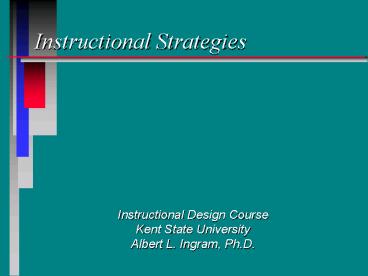Instructional Strategies - PowerPoint PPT Presentation
1 / 25
Title:
Instructional Strategies
Description:
Which of the following is NOT a component of an instructional strategy? ... Attitudes. Feelings, behaviors, cognition. Modelling. Respected Model. Cognitive Dissonance ... – PowerPoint PPT presentation
Number of Views:33
Avg rating:3.0/5.0
Title: Instructional Strategies
1
Instructional Strategies
- Instructional Design Course
- Kent State University
- Albert L. Ingram, Ph.D.
2
Components of an Instructional Strategy
- Which of the following is NOT a component of an
instructional strategy? - Sequence of objectives taught
- Media to be used in the instruction
- Choice of which objectives to teach
- Methods and tactics of instruction
3
Components of an Instructional Strategy
- Defining the components of instructional
strategies - Sequence of objectives taught
- What order?
- Who decides and when?
- Media to be used in the instruction
- What difference does it make?
- Why do you choose different media?
- Methods and tactics of instruction
- What are the actual events and interactions?
4
Possible Sequences
- Here are several possible sequences of
instruction. Add at least two more. - Chronological
- Concrete to Abstract
- Linear
- ????
- ????
5
Some Other Sequences
- Pre-requisite order
- Hierarchy sequence determined by student
performance - Learner controlled
- Backward chaining
- Whole to part/part to whole
- Egrul/Ruleg
- Topical
6
Grouping Objectives
- Do you have to teach each objective explicitly
and separately? - Why or why not?
7
Factors Affecting Grouping
- Age of Learners
- ???? of the Material
- Type of ????
- Whether the activity can be ????
- Time available to include events of instruction
8
What are Media of Instruction?
- Carriers of Instruction?
- Does the medium affect the message?
- Factors in Choosing Media
9
Methods and Tactics
- Presentation
- Mode
- Cues
- Advice
- Examples
- Interactions
- Questions
- Tasks
10
Nine Events of Instruction
- Gaining ????
- Informing learner of the ????
- Stimulating ???? of prerequisite learning
11
Nine Events of Instruction
- Gaining attention
- Informing learner of the objectives
- Stimulating recall of prerequisite learning
12
Nine Events of Instruction - 2
- Presenting the ???? material
- Providing ???? guidance
- Eliciting the ????
- Providing ???? about performance
13
Nine Events of Instruction - 2
- Presenting the stimulus material
- Providing learning guidance
- Eliciting the performance
- Providing feedback about performance
14
Nine Events of Instruction -3
- ???? the performance
- Enhancing ???? and transfer
15
Nine Events of Instruction -3
- Assessing the performance
- Enhancing retention and transfer
16
Motivational Design
- Attention
- Relevance
- Confidence
- Satisfaction
17
Examples and Practice Items
- How similar to final outcome?
- Varying
- Enough
18
Instructional Strategies for Specific Types of
Learning
- Verbal Information
- Intellectual Skills
- Concepts
- Rules
- Procedures
- Problem Solving
- Motor Skills
- Attitudes
19
Verbal Information
- Context
- Link to known
- Organizational structure
- Subsets
- Mnemonics
- Technology can be useful
- Drill
20
Intellectual Skills - Concepts
- Distinguishing characteristics
- Ruleg and egrul
- Examples
- Practice
- Choosing examples and practice items
- Feedback
21
Intellectual Skills -- Rules
- Kinds of rules
- Natural connection
- Consequences
- Verbal knowledge of rules vs. use
22
Intellectual Skills - Procedures
- Backward Chaining
- Clustering Steps
- Knowledge vs. use
23
Intellectual Skills -- Problem Solving
- Metacognition
- Recall of subordinate rules
- Modelling
- New tasks
- Problem variations
24
Motor Skills
- Executive routines to automaticity
- Practice, practice, practice
25
Attitudes
- Feelings, behaviors, cognition
- Modelling
- Respected Model
- Cognitive Dissonance































